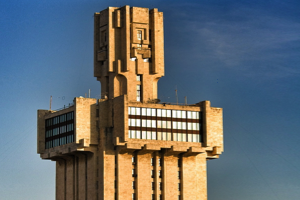In 1983 Paolo Portoghesi connected the rise of architectural postmodernism to the struggle of the Polish Solidarity movement, writing: “The architecture of our century opposes ideology to life, projects to reality.” This statement points to an ambition, shared by many postmodern architects, to position style and aesthetic as a form of politics, while complicating the geographical narratives of architecture postmodernism originating from the West. Yet because categories such as “ideology,” “life,” “project” and “reality” were understood and used quite differently by different architects in different political, economic and cultural contexts, it also points to the need to place the study of principles underlying postmodern architecture in the context of global politics and international relations, what we call postmodernism’s geopolitical aesthetic.
Prompting a particular bonding between design and ideology, the flourishing of postmodern aesthetics in the global West, East and South was arguably connected to the shift from late socialism to late capitalism. Yet very few postmodern authors and architects would acknowledge their complicity with capitalist expansion. Through examples of postmodern translations in Chile, East Germany, Italy, the Soviet Union and the US, this special collection examines the roles of politics and aesthetics in the global expansion of architectural postmodernism.
Was postmodernism an instrument of propaganda or dissent? How was it shaped by processes of restructuring in late capitalism as well as “late socialism”? What were the criticisms levelled at postmodern style and ideas? What was translated and what was lost in postmodern exchanges between architects in the West, East and South? By examining these questions this special collection will contribute to emerging global histories of architectural postmodernism.
The collection includes four original articles plus an introduction by editors Maroš Krivý and Léa-Catherine Szacka.
Lidia Klein, University of North Carolina at Charlotte "Between Propaganda and Dissent: Postmodern Architecture in Pinochet’s Chile"
Aaron Cayer, University of New Mexico "Aesthetics of Indeterminacy: The Architecture of Conglomerate Corporations"
Torsten Lange, ETH Zurich “Entertainment Value: The Friedrichstadtpalast and Late-Socialist Critiques of Postmodernism”
Da Hyung Jeong, New York University “Italo-Soviet Architectural Exchanges and Postmodernism under Late Socialism”
Research Article
Aesthetics of Indeterminacy: The Architecture of Conglomerates
Aaron Cayer
2023-03-10 Volume 11 • Issue 1 • 2023 • Volume 11
Also a part of:
Italo-Soviet Architectural Exchanges and Postmodernism under Late Socialism
Da Hyung Jeong
2024-05-27 The Geopolitical Aesthetic of Postmodernism
Also a part of:
Editorial
Geopolitics, Aesthetics and Postmodern Architecture
Léa-Catherine Szacka and Maros Krivy
2025-05-07 The Geopolitical Aesthetic of Postmodernism
Collections
-
The Two Mediterraneans that Live Apart, Together: Making Architectures and Writing Histories
Women’s display. Women’s exhibitions and exhibition design in the 20th century
Building Civic Identities. Communal Palaces in Italian Urban History (14th-17th Centuries)
Intersecting Practices: Architecture and the Visual Arts in Early Modern Europe - Italy and the Netherlands
The Geopolitical Aesthetic of Postmodernism
Architects as Global Entrepreneurs (1850-2000)
From Ration Cards to Refugee Camps: Architecture, Bureaucracy, and the Global State of Emergency during World War One
Comprador Networks and Comparative Modernities
Architectural Historiography and Fourth Wave Feminism
Marxism and Architectural Theory across the East-West Divide
Resilience in Architectural History
On Style
On the meaning of 'Europe' for Architectural History
Travel
Building Word Image: Printing Architecture 1800-1950
Objects of Belief: Proportional Systems in the History of Architecture
Culture of Crisis
